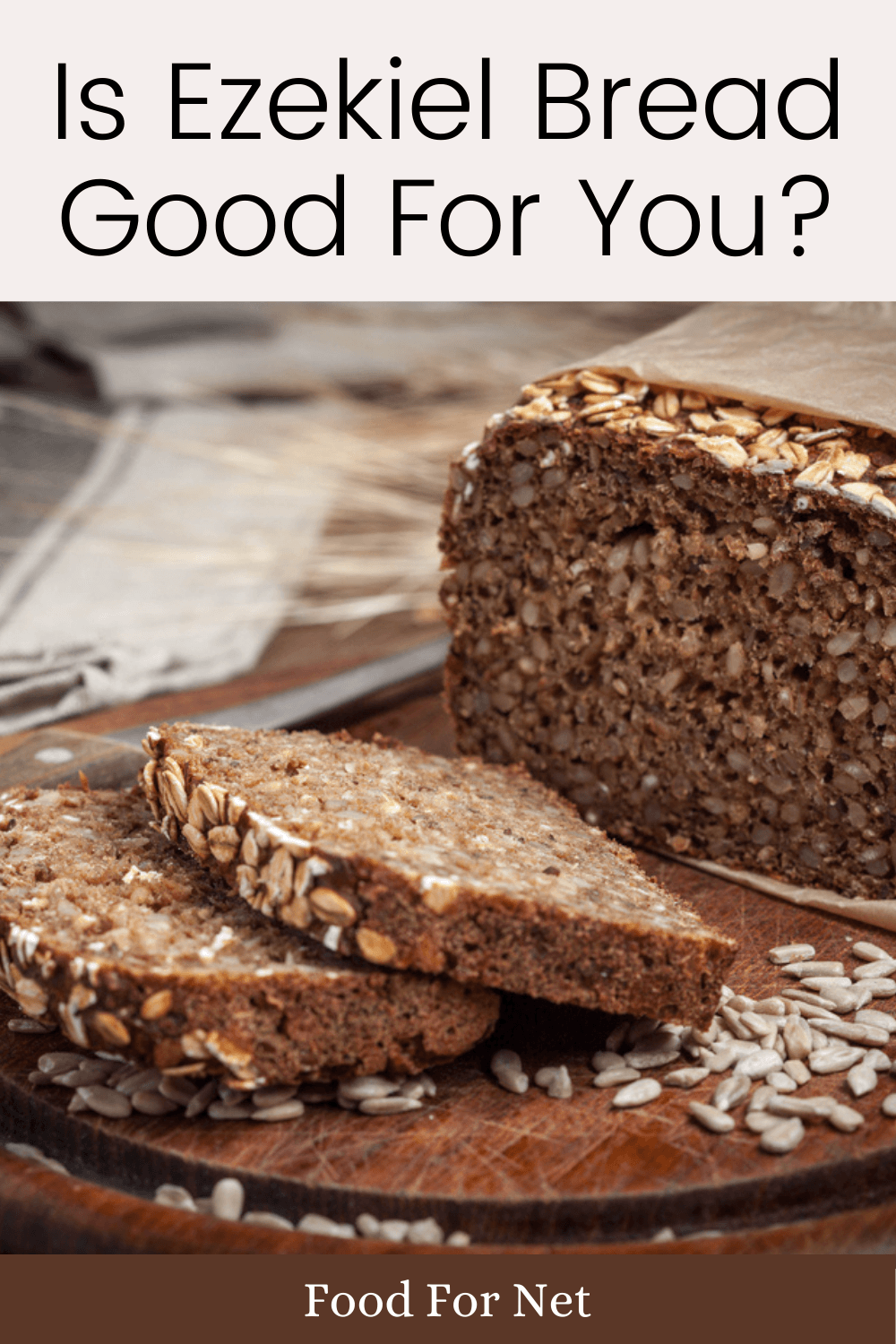
If you’re looking for the healthiest bread, you’ve probably heard about Ezekiel Bread. It’s hard not to. The bread is often used as an example as the healthiest possible bread that you can eat, but is Ezekiel bread good for you?
That’s not just a wild claim either. Ezekiel Bread does have a lot going for it, especially as it’s a type of sprouted bread. That sprouting process could be powerful, as it increases nutrient availability and decreases the levels of antinutrients.
Ezekiel Bread is almost certainly healthier than regular white bread, but what about the bigger question? Is Ezekiel Bread good for you? Should you be eating the bread regularly or is it a poor choice?
After all, bread is mired in controversy. There are plenty of concerns about the carb content, the gluten, and the use of grains, and other issues. To look at whether Ezekiel Bread is healthy, we also need to consider these debates.
Is Ezekiel Bread Good For You?
- What Is Ezekiel Bread?
- What Does The Bread Taste Like?
- Types Of Ezekiel Bread
- The Benefits Of Ezekiel Bread
- The Problems With Ezekiel Bread
- What About The Gluten Free Products?
- Should You Eat Ezekiel Bread?
- Why Is It Called Ezekiel Bread Anyway?
- Making Your Own Sprouted Bread
- Final Thoughts
What Is Ezekiel Bread?
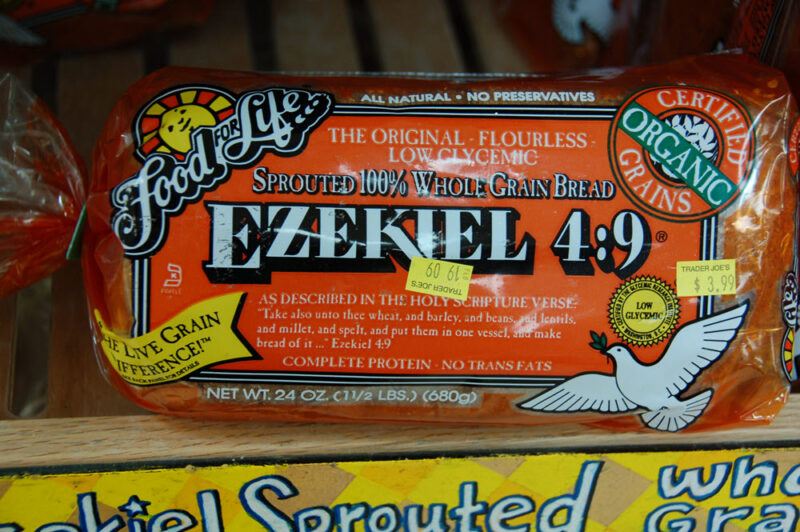
Ezekiel Bread is interesting. It’s a type of sprouted bread, which means that the grains are sprouted before they’re used. Doing so increases the nutrient availability of the grains, giving you more zinc, magnesium, iron, and vitamin C, along with some other nutrients.
Ezekiel Bread goes a step beyond regular sprouted bread, though, as it is also a flourless product. To make the bread, sprouted grains are mashed to form a type of dough, which can then be baked.
There are now many different Ezekiel Bread products, which differ in the grains they use and other ingredients. However, most include a variety of sprouted whole grains, which all provide essential nutrients.
There’s another interesting feature too – many of the Ezekiel Bread products, including the original, don’t just rely on grains. Legumes also make their way into the mix, including soybeans and lentils.
These legumes provide a different nutrient balance than grains, making the bread even more nutritious, but they come with associated controversies too.
What Does The Bread Taste Like?
Because Ezekiel Bread is low in sugar, it doesn’t have the slight sweetness that you find with most loaves of bread. The flavor of the grains shines through instead, often giving your bread a slightly nutty taste. Also, there are texture differences, as most Ezekiel Bread products are chewier than regular bread and aren’t as soft.
These differences mightn’t be a problem if you eat whole grain bread anyway. If you’re swapping from white bread to Ezekiel Bread, you might need some time to adjust.
Lightly toasting the bread can help as well. This helps to give you a more familiar texture. After you’ve been eating Ezekiel Bread for a while, you might find that you enjoy it as-is, with no need for toasting.
Types Of Ezekiel Bread
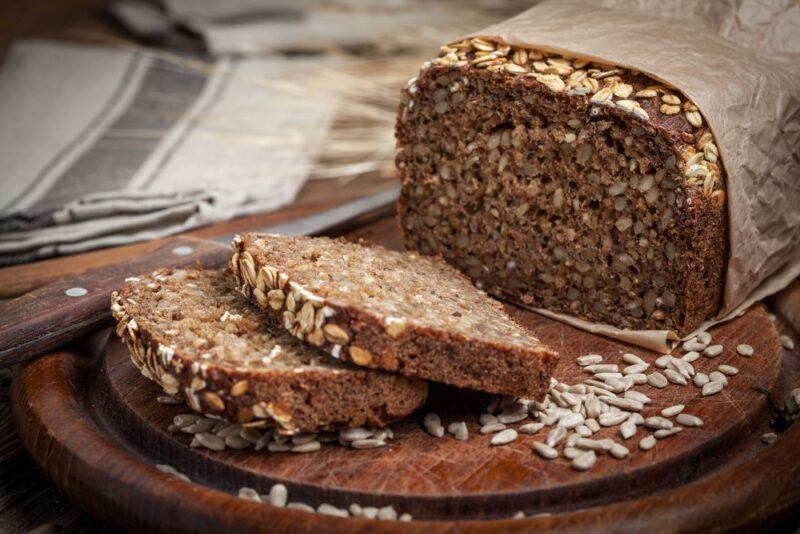
As the popularity of Ezekiel Bread has soared, the company has been expanding its range, making many different products to satisfy demand.
Their current selection of bread, for example, includes these products:
- Sprouted Whole Grain Bread
- Sesame Sprouted Whole Grain Bread
- Cinnamon Raisin Sprouted Whole Grain Bread
- Flax Sprouted Whole Grain Bread
- Low Sodium Sprouted Whole Grain Bread
- 7 Sprouted Grains Bread
- 7 Sprouted Grains Cinnamon Raisin Bread
- Sprouted Whole Grain and Seed Bread
There’s also a selection of gluten free vegan-friendly breads, including brown rice, black rice, raisin pecan, rice almond, rice millet, rice pecan, white rice, yeast free brown rice, and multi seed rice bread. Those breads aren’t sprouted, but Ezekiel Bread does have four Sprouted for Life products that are gluten free and use sprouted chia seeds, quinoa, and millet.
Quite a list, right?
That’s just the breads. The company also offers English muffins, tortillas, pasta, buns, waffles, pocket bread, and much more.
For this discussion, we’re focusing on the breads themselves. Still, many of the same principles will apply to the other products as well.
The Benefits Of Ezekiel Bread
Provides More Nutrients Than Regular Bread
Bread, particularly white bread, is famous for being low in nutrients. This isn’t the case for Ezekiel Bread at all. Instead, the reliance on whole grains and legumes means that there are plenty of nutrients.
In fact, a slice of the original Ezekiel Bread contains roughly 25% of your daily selenium intake and 35% of your manganese intake, along with decent amounts of niacin, vitamin B6, iron, zinc, and magnesium.
Then there’s the protein and fiber. The original product gives you 5 grams of protein and 3 grams of fiber per slice. This is impressive for bread and incredibly important.
Not only are protein and fiber both highly relevant for your health, but they also help you to feel satisfied for longer. This should mean that your toast and sandwiches give you sustained energy, making it easier to get through the day.
The Bread Doesn’t Use Flour
Ezekiel Bread is flourless. This is incredibly important, as grinding grains to make flour means that our bodies digest them quickly, leading to blood sugar spikes. This is even true for flour made from whole grains.
Avoiding flour means that Ezekiel Bread should have a less dramatic effect on your blood sugar. It may be better for your metabolism as well, along with many other aspects of your health.
A Source Of Whole Grains
Most health recommendations say that we need to be eating more whole grains. Such grains are full of nutrients, antioxidants, and fiber. They’ve also been linked to improved health in many ways, helping to decrease your risk of type 2 diabetes, heart disease, obesity, and many other health problems.
Indeed, one of the easiest ways to improve health is to decrease your intake of simple carbs and consume more whole grains instead. Doing so often involves moving away from highly processed foods and looking for whole grain rich alternatives instead.
Ezekiel Bread may be even more impressive than some whole grain foods because the grains are sprouted. It has been through some processing, true, but much less processing than most other types of bread.
It’s Low In Sugar And Sodium
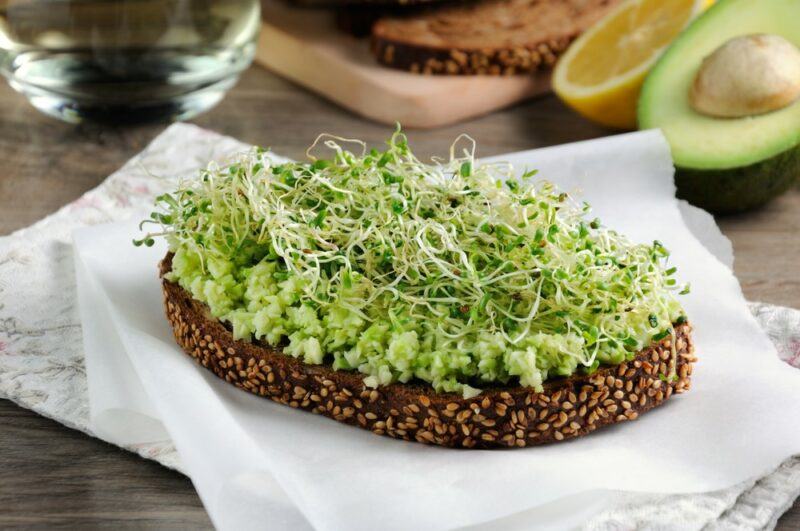
Bread often contains a surprising amount of sugar. This isn’t true for Ezekiel Bread. Many of their products don’t have any added sugar at all.
While doing so makes the bread a little less sweet, the tradeoff is undoubtedly worth it. After all, sugar doesn’t offer any health benefits at all. Instead, it increases inflammation, raises the risk of type 2 diabetes, and easily leads to obesity.
The sodium content of the bread is pretty impressive too. For example, the original version of the bread contains just 75 mg of sodium per serving. Many other products contain more. There’s even a low sodium version that avoids sodium entirely.
This is a valuable feature, as many of us consume too much sodium. Getting a little less sodium in your bread is always a good thing.
It’s Easy To Digest
Whole grains are often difficult to digest, partly due to their starch content. Sprouting grains first reduces the starch and improves the grain’s digestibility.
This is why you get more nutrients from sprouted grains than from whole grains. The increased digestibility is excellent news for anyone with digestive difficulties. In fact, some people with irritable bowel syndrome find that they can enjoy Ezekiel Bread without an issue.
Could Help With Weight Loss
Ezekiel Bread often contains around 80 calories per slice, includes a surprising amount of protein, and is packed with nutrients. These features all make it helpful for weight loss.
The bread should also keep you full for much longer than a regular slice of white bread. You’ll see even more benefits if you serve the bread with a source of protein or healthy fats. Nut butter or avocados are two good starting places.
You could even use it as the base of an open-faced sandwich. Adding extra ingredients like this gives you a more filling meal and helps to offset any blood sugar impacts from the carbs.
Organic And Non-GMO
Food for Life (the company behind Ezekiel Bread) takes pains to make sure the products are as healthy as possible. Most are USDA certified, non-GMO, glyphosate-free, and even kosher.
Such certifications can make you feel much more confident in the quality of your food. The approaches should make the bread healthier too, reducing the likelihood of pesticide contamination or any genetically modified ingredients.
It’s Free From Preservatives
Most grocery store breads rely on preservatives, which help them to last longer. Ezekiel Bread doesn’t do this.
This is fantastic news if you’re wanting food that’s as natural as possible. You can thaw out the whole loaf if you want to, but many people simply thaw individual pieces as they need them, often in the toaster. Doing so helps your loaf of bread to last much longer.
Can Be Good For Diabetics
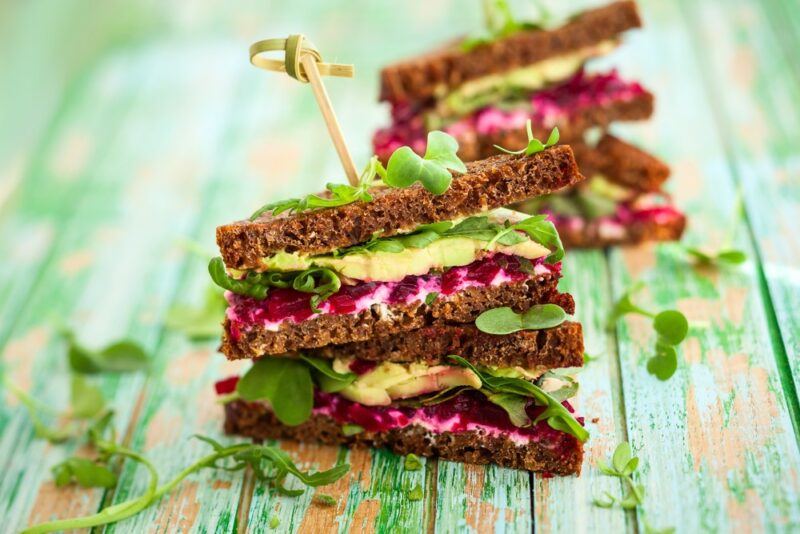
Ezekiel Bread can be an excellent choice for anyone with diabetes, as it’s low in sugar and high in fiber. Eating it instead of regular bread could help to stabilize your blood sugar levels, decrease the risk of heart disease, and perhaps lower the risk of diabetes complications.
The Problems With Ezekiel Bread
Still Relies On Grains
Grains remain controversial. While studies have linked whole grains to countless health benefits, many questions still remain.
Part of the problem is that grains have some fantastic features and some concerning ones. In particular, grains contain so-called antinutrients, which decrease our absorption of some nutrients and can be challenging to digest. The sprouting process decreases the levels of antinutrients, but doesn’t get rid of them completely.
Most research suggests that the good features of bread far outweigh the bad, the question remains, should you be eating ingredients with such significant bad features?
Would it be better to skip grains instead and get the same nutrients and fiber elsewhere in your diet? This argument is why some people, including paleo dieters, avoid grains entirely.
High In Carbs
Ezekiel Bread contains fewer carbs than many types of bread, to the extent that some low carb dieters might even be able to have a slice. Still, it’s far from carb free.
The original version of the bread contains 15 grams of carbs and only 3 of those come from fiber. Some versions are even higher in carbs than this.
Because these carbs come from whole grains, they should be better for you than the carbs found in white bread. Still, even carbs from healthy sources can impact your blood sugar levels.
The Gluten Content
Most Ezekiel Bread products rely on wheat, so they also contain gluten. As such, anyone with celiac disease or a gluten sensitivity may need to steer clear of the bread.
There are some gluten free alternatives from the company, including a handful of sprouted gluten free breads. However, these have different nutrient profiles and benefits than regular Ezekiel Bread. In fact, many of the gluten free Ezekiel Bread products aren’t as powerful as the original version of the bread.
The Use Of Soybeans
Some Ezekiel Bread products, including the original bread, use soybeans as an ingredient. While soybeans are nutrient-packed and may offer many benefits, they’re also controversial.
Part of the problem is the phytoestrogen, which can act like estrogen in our bodies, in some situations. However, if this leads to negative effects, it does so rarely. The phytoestrogens may even provide benefits.
For most people, soy will only be an issue if you’re eating extreme amounts of it. Still, if you’re concerned, there are plenty of soy free sprouted breads out there.
It Spoils Quickly
Ezekiel Bread is made from sprouted grains and doesn’t contain preservatives. This combination of features means that the bread will deteriorate fast.
Freezing the bread is an easy way around the problem, as you’re keeping the bread at its best. If you want to thaw the whole loaf, be prepared to eat it within a few days.
What About The Gluten Free Products?
The gluten free Ezekiel Breads are a little different, as they don’t use wheat. Most of them aren’t that exciting. They’re just regular gluten free bread. That’s it.
Their brown rice bread, for example, uses brown rice flour, tapioca flour, and yeast as some of the main ingredients. It isn’t that different than brown rice bread from any other company.
Breads like this help you to avoid some of the issues with wheat and gluten, but you’re still consuming some type of grain. The breads are also flour-based, so the sugar they contain will hit your bloodstream pretty fast.
Then there are the Sprouted For Life Products. These are unusual because they still rely on sprouted grains (chia seeds, quinoa, and millet), even though there’s no wheat present.
The grains give the bread an extra boost of nutrition, making it a better choice than many other gluten free breads. Still… the regular Ezekiel Bread products are still a better choice for nutrients and protein.
Should You Eat Ezekiel Bread?
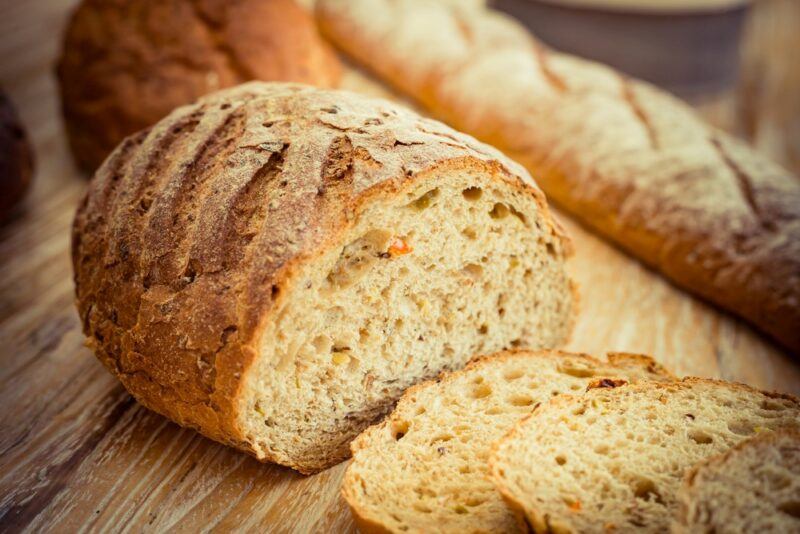
There’s little doubt. Ezekiel Bread is much healthier than the refined white bread that you find in your local stores. It’s even better than whole grain breads, as the sprouting gives you access to more nutrients.
Plus, the company keeps the processing and additives low, which is impressive for any store bought loaf of bread.
If you want real bread, Ezekiel Bread is almost as good as you can get. But… it is still bread. It still has some of the same issues that plague normal bread, including the gluten content and the carbs.
Whether these are an issue really depends on your point of view, as there are plenty of people on either side of that debate.
Why Is It Called Ezekiel Bread Anyway?
Ezekiel Bread gets its name from the Bible. Specifically, chapter 4, verse 9 of Ezekiel states “take wheat and barley, beans and lentils, millet and spelt; put them in a storage jar and use them to make bread for yourself.”
The original version of Ezekiel Bread follows this idea closely, while other breads from the company vary in their ingredients.
That said, the bread was never designed as a religious product. Instead, the Bible version acted as inspiration for the bread.
Making Your Own Sprouted Bread
To see even more benefits, you could try making your own sprouted bread. Doing so gives you all the benefits that you find with Ezekiel Bread, except that you also get complete control over the ingredients.
There are plenty of recipes out there, like this one from Wholehearted Eats.
However, the quality of recipes vary dramatically. Many of them include some flour, rather than just using sprouted grains. This isn’t ideal, as some of the benefits of Ezekiel Bread come from the fact that you’re avoiding flour.
Some recipes are also high in sugar, which increases the carb content of the bread still further. As a result, you might need to do some searching to find a recipe that gives you tasty and healthy bread.
Final Thoughts
Ezekiel Bread is one of the few products that really does deserve the hype that surrounds it. The bread is packed with nutrients and is an easy source of whole grains. The sprouting process is fantastic too, making the bread easier to digest and increasing the nutrient availability.
However, we’re still talking about a wheat-based product that contains gluten and is a decent source of carbs. Those features aren’t ideal. If you’re worried about carbs or gluten, you might need to look for something different entirely, like keto seed breads.
Frequently Asked Questions
Is Ezekiel Bread Gluten Free?
The regular product line from Ezekiel Bread does contain gluten, as the recipe still relies on gluten containing grains. The company does have a gluten free bread selection as well, which tend to be much safer.
There’s a catch, though. Most of the gluten free products from Ezekiel Bread aren’t sprouted, so they’re not very different from regular gluten free bread. Thankfully, there are a few sprouted gluten free options, called Sprouted For Life. These are your best bet if you’re looking for healthy gluten free Ezekiel Bread.
Is Ezekiel Bread Keto Friendly?
While Ezekiel Bread often contains fewer carbs than conventional white bread, it isn’t exceptionally low in carbs. In fact, the original version contains around 12 net grams of carbs per serving, making it a poor choice for keto.
You could theoretically still have half a serving or so of Ezekiel Bread on a keto diet, as long as your macros allowed for it. Still, most keto dieters wouldn’t do this, as the carb content is high for a single ingredient.
Why Is Ezekiel Bread Frozen?
Ezekiel Bread needs to be kept frozen to make sure it stays fresh. After all, the product doesn’t have all the preservatives found in regular bread, so it won’t last long outside the freezer.
You can take Ezekiel Bread out of the freezer and store it in the fridge instead. However, you’ll need to use it quickly, as it will spoil faster than other types of bread.
Is Ezekiel Bread Good For Diabetics?
Ezekiel Bread contains a decent amount of carbs, so diabetics still need to be cautious with it. However, the use of sprouted grains rather than flour means that the glycemic index is lower than with other types of bread.
Diabetics could focus on low carb bread alternatives instead, which are less likely to spike blood sugar. However, the whole grains in Ezekiel Bread could be helpful in the long term, as whole grains are associated with many health benefits.
Is Ezekiel Bread Vegan?
Yes. All of the products from Ezekiel Bread are vegan friendly. The company avoids using any animal derived ingredients at all.

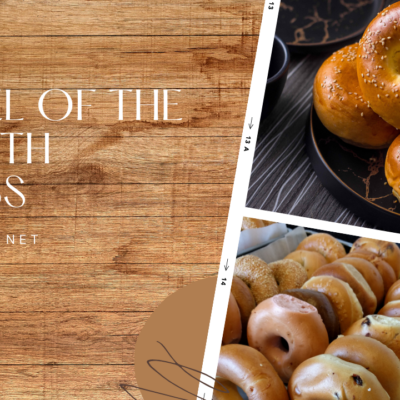
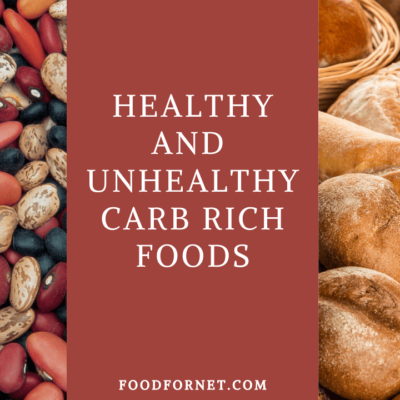
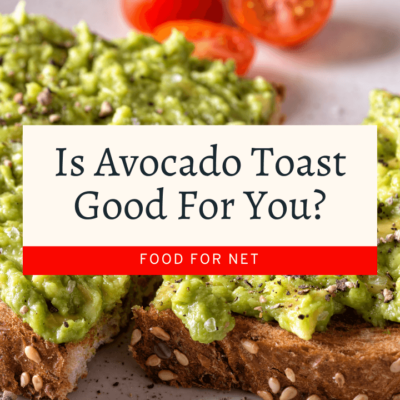
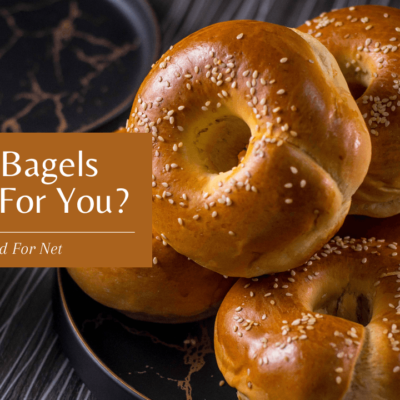

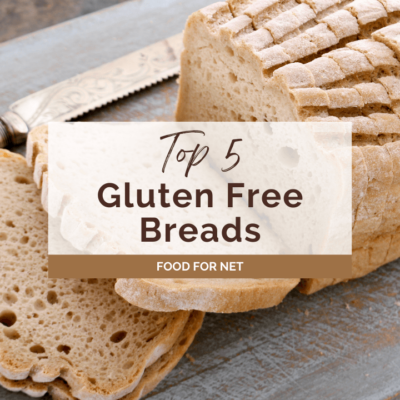
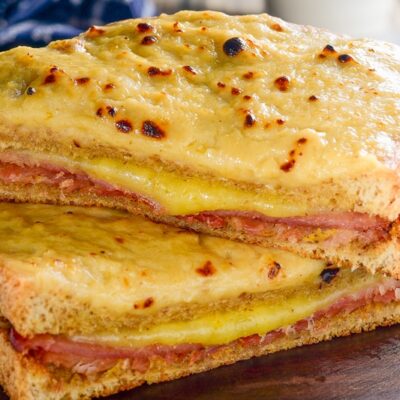
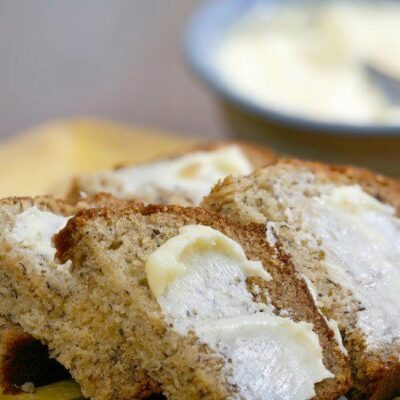

 Are Plant-Based Sausages Good For You?
Are Plant-Based Sausages Good For You?
Leave a Reply